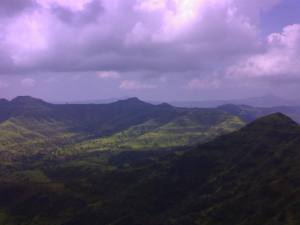The 27 Year War That Changed Course Of Indian History – VII
For centuries , the mountains and valleys, towns and villages of Deccan had gotten used to being a pawn in the game of power. They changed hands as kingdoms warred with each other. They paid taxes whoever was in a position to extract them. For the most part they remained in a sleepy slumber, just turning and twisting in their bed.
Once in a while they sent their sons to fight in battles without ever asking why exactly the war is being launched. Other times they fought amongst themselves. They were divided, confused and did not have high hopes about their future.
This was the condition of Deccan when Shivaji launched his first expedition of fort Torana in 1645. By the time of his death mere 35 years later, he had transformed Deccan from a sleepy terrain to a thundering volcano.
Finally, here was a man whose vision of future was shared by a large general audience. An unmistakable characteristic of a modern concept of "nation-state". Perhaps the most important factor that distinguishes Shivaji's vision is that it was "unifying". His vision went beyond building an army of proud warriors from warrior castes. It included people from all rungs of society sharing a common political idea and ready to defend it at any cost. His vision went far beyond creating an empire for himself in Maharashtra. It included a building confederacy of states against what he thought were foreign invaders. He was trying to build an Alliance of Hindu kingdoms. He went out of his way to convince Mirza-Raje Jaisingh to leave Aurangzeb. He established relations with the dethroned royal family of Vijaynagar for whom he had tremendous respect. He attempted to unify the sparring Hindu power centers.
And they responded. Sikhs in Punjab, Rajputs in Rajasthan, Nayaks in Karnataka, rulers of Mysore, the royal family of Vijaynagar were of valuable help to Shivaji and later to Marathas. It was certainly a step towards a nation getting its soul back.
While he was creating a political voice for Hindus, Muslims never faced persecution in his rule. Several Muslims served at high posts in his court and army. His personal body guard on his Agra visit was Muslim. His Naval officer, Siddi Hilal was Muslim. Thus Shivaji's rule was not meant to challenge Islam as a personal religion, but it was a response to Political Islam.
Last but not the least, we must give due respect to one more thing. The seeds of every political revolution can be traced back to a spiritual one and this was no exception. The "Bhakti" movement in Maharashtra that began with 12th Century saint Dnyaneshwar and spearheaded by saint Tukaram (who was contemporary of Shivaji), played a role of social catalyst of immense effect. It created a forum, a pool in society where everyone was welcome. The shackles of cast system were not broken, but were certainly loosened. Once people were on the same page spiritually, it was easier for Shivaji to get them on the same page politically.
It's tempting for a Maharashtrian to claim the root of success of Marathas solely be in Maharashtra. But at the height of it's peak, only 20% of Shivaji's kingdom was part of Maharashtra. When Marathas launched northern campaigns in 18th century, it was even more less. Soldiers in Maratha army came from diverse social and geographical backgrounds including from areas as far away as Kandahar to West and Bengal to East. Shivaji received a lot of support from various rulers and common people from all over India.
Thus limiting Marathas to Maharashtra is mostly a conclusion of a politician. It must be noted that the roots of Maharashtra culture can be traced to both ancient Karnataka and Northern India. Shivaji himself traced his lineage to Shisodia family of Rajputs. Maharashtrians should not be ashamed to admit that their roots lie elsewhere. In fact they should feel proud that land of Maharashtra is truly a melting pot where Southern and Northern Indian cultures melted to give birth to a new vision of a nation. Shivaji was far more an Indian king than a Maratha king.
Dear readers, here ends the story of an epic war. I hope this saga gives you a sense of realistic hope and a sense of humble pride. All you might be doing today is sitting in a cubicle for the day ,typing on keyboard. But remember that the same blood runs in our fingers that long long time ago displayed unparalleled courage and bravery, the same spirit resides within us that can once soured sky high upon the call of freedom.
Jai Hind !!
Aano bhadra krtavo yantu vishwatah.(- RIG VEDA)
"Let noble thoughts come to me from all directions"
REGARDS
Miss.Shaija Vallikatri Bhaskaran
www.keralites.net         |
To subscribe send a mail to Keralites-subscribe@yahoogroups.com.
Send your posts to Keralites@yahoogroups.com.
Send your suggestions to Keralites-owner@yahoogroups.com.
To unsubscribe send a mail to Keralites-unsubscribe@yahoogroups.com.
Homepage: www.keralites.net

No comments:
Post a Comment